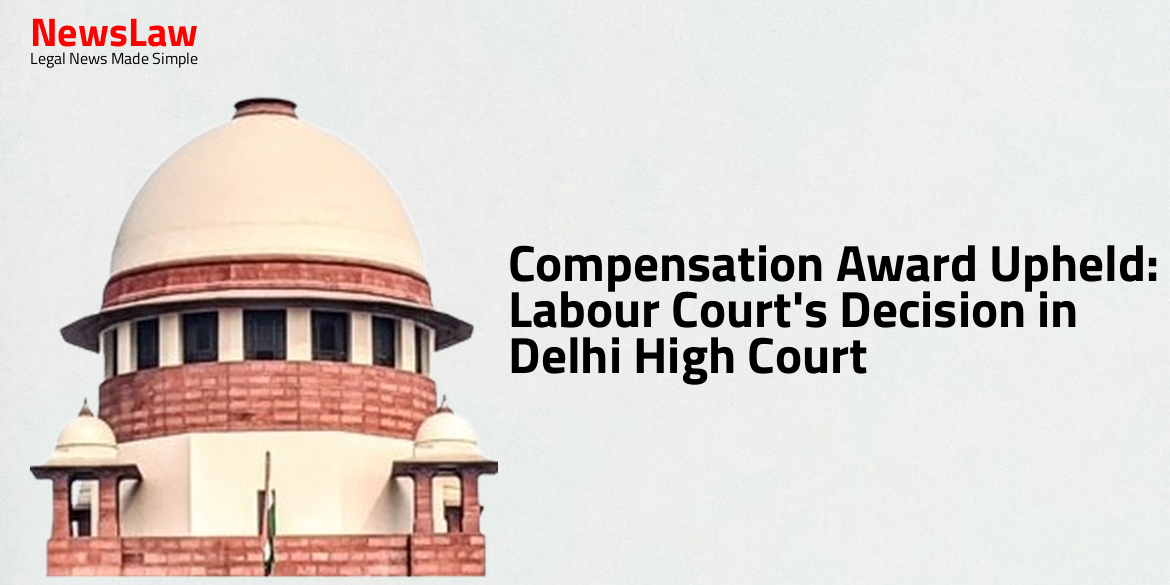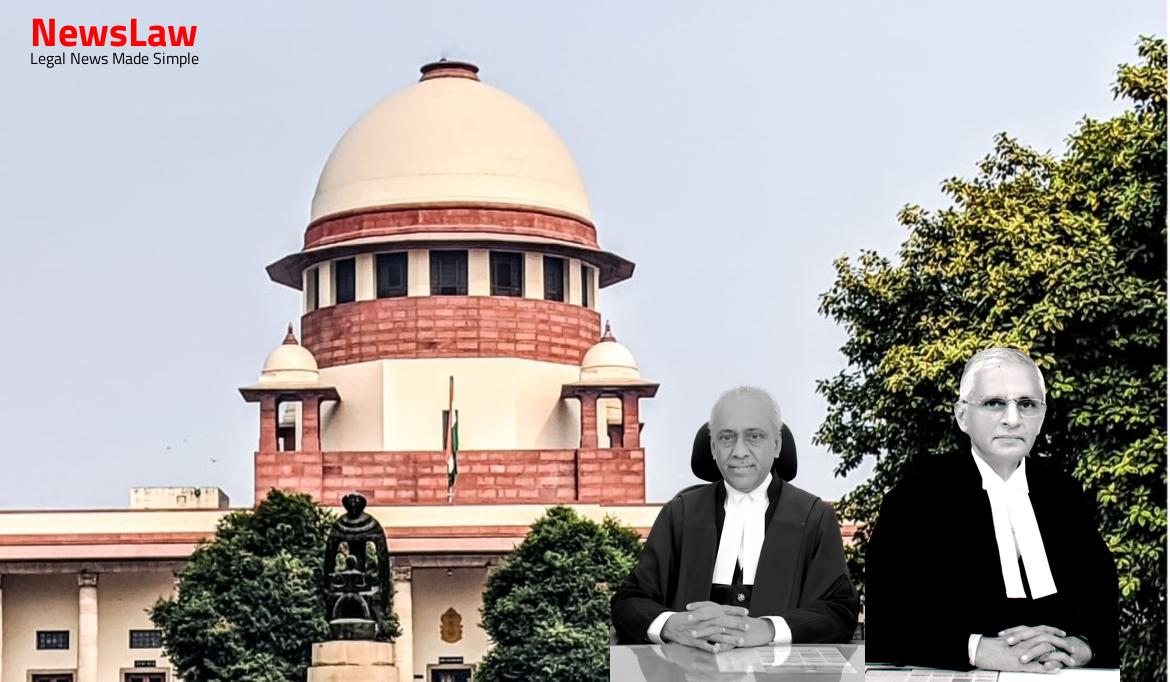In a recent ruling by the Delhi High Court, the decision of the Labour Court regarding the award of compensation to the workman has been upheld. This decision marks an important development in the realm of labour law and justice. Stay tuned to learn more about the specifics of this case and its implications.
Facts
- The workman failed to raise any objections regarding his designation and salary while working with the management.
- The Industrial Tribunal’s judgment did not designate the workman as skilled as per the minimum rates of wages notified in Delhi.
- The workman was paid according to the prescribed salary for an unskilled worker throughout his employment.
- The stay granted in other court cases does not apply to the current matter as the circumstances are different.
- Both parties showed no urgency in seeking a stay in the designated writ petition, indicating lack of pressing need.
- The Hon’ble High Court of Delhi stayed the operation of the award granted by the Labour Court.
- The Labour Court decided in favor of the respondent workman, granting a lump-sum compensation of Rs.200,000 to be paid by the petitioner management.
- The compensation also includes interest at 9% per annum until the payment is made.
- The argument that the workman should receive wages of skilled and semi-skilled workers due to their designated status was raised.
- The issue of back wages from the date of the award till a specified date was left for the Hon’ble High Court to decide.
- The transfer of the claimant and 20 other workers was declared illegal by POIT, which was later stayed by the High Court of Delhi.
- Sections 9A and 25-N of the Act were deemed inapplicable by the Labour Court in this case.
Issue
- The issue at hand is whether the stayed award of the Industrial Tribunal can be relied upon by the learned Labour Court to determine the entitlement to compensation.
- The Workman in question was receiving the salary of ‘unskilled’ labor from the time of appointment till the point of retrenchment.
- The framed issues for adjudication are – 1. Whether the termination of services and retrenchment of the workman violated Section 25F of the Act. 2. Whether the stayed award of the Industrial Tribunal can be used to establish the entitlement to compensation.
- The central question for the Court to decide is whether the Labour Court’s award should be challenged under Article 226 of the Constitution of India.
Arguments
- The award dated 29 September, 2009 was in operation at the time of the workman’s illegal retrenchment on 5 May, 2010.
- The learned Labour Court erred in applying judgments that were not relevant to the present matter.
- The workman has been willing to perform his duties but was kept away without proper reason.
- The impugned award was passed based on a stayed award, which should not have been considered.
- The petitioner management’s written statement requested the decision to be postponed until a specific matter is resolved.
- The compensation in the award was based on the designation given in a previous award.
- The petitioner failed to show any illegality or perversity in the impugned award.
- It is beyond the scope of the court to re-evaluate the evidence unless clear illegality is proven.
- The petitioner argued that if there was an amount due to the worker, it could be settled after the pending dispute is resolved.
- Ld. ARM argued that granting designation to the claimant has been stayed by the correctly calculated retrenchment compensation and notice pay as per their last drawn wages.
- The award dated 29.09.2009 was not challenged by the claimant before any forum, making it final and operating as res-judicata.
- Claimant filed a case against his transfer, where it was determined by POIT that he was engaged in unskilled work.
Analysis
- Both parties had filed a designation case before POIT, decided in favor of workers in 2009.
- Observation of POIT in transfer case does not act as res-judicata.
- POIT held transfer illegal in one case.
- Misplacement of reliance upon an award stayed by the High Court.
- Management failed to calculate notice pay and compensation as per the 2009 award.
- Evidence showed the workman was a skilled/semi-skilled worker, not an unskilled laborer.
- Management violated Section 25-F of the I.D. Act, 1947 by not compensating according to designated skilled category.
- Labor Court rightly awarded compensation as per the designated workmen.
- The Court observed that the workman was entitled to compensation as per the skilled designation.
- The retrenchment was held illegal due to insufficient compensation and improper designation consideration.
- Previous decisions of the Supreme Court and High Courts emphasize the duty of the Court to restore parties to their original position after the dismissal of a case where a stay was in effect.
- The distinction between a repeal and a suspension of a law is clarified, with a repeal removing the law entirely and a suspension allowing the law to continue in operation except where it was suspended.
- Citing the case of Shree Chamundi Mopeds Ltd, the Court highlights the importance of restitution in legal proceedings, ensuring that parties are not prejudiced by the Court’s actions.
- The obligation of the Court to restore parties to their original position is reiterated in cases such as Kanoria Chemicals and Industries Ltd. v. U.P. State Electricity Board.
- The principle of restitution, as enshrined in Section 144 of the Civil Procedure Code, is seen as a guiding factor in determining the liabilities of parties after the dismissal of a case.
- The Court refers to judicial decisions like Shree Chamundi Mopeds Ltd. v. Church of South India Trust Assn. to emphasize the importance of reinstating parties to the position they would have been in if the case had not been stayed or dismissed.
- Section 25-F of the Act sets conditions for retrenchment of a workman.
- Employer must give one month’s notice or pay wages in lieu of notice for retrenchment.
- Employer must pay compensation equivalent to fifteen days average pay for every completed year of continuous service or any part thereof in excess of six months during retrenchment.
- Notice to the appropriate government is required for a valid claim for compensation under this Section.
- Workman must have been in continuous service for at least one year with the employer to claim compensation.
- Learned Labour Court found that the petitioner management retrenched the workmen illegally
- Workmen were not compensated as per their designation
- Petitioner management failed to present any propositions in their favor
- Court held that there is no merit in the petitions
- No illegality in the findings recorded by the Labour Court
Decision
- The petitioner management is directed to pay the compensation as awarded by the learned Labour Court to the respective workmen within three months.
- The instant batch of petitions stands dismissed.
- Management is directed to pay Rs.2,00,000/- (Rupees Two Lakhs Only) to the workman within one month from the date of publication of the award.
- Failure to pay within the stipulated time will result in liability to pay interest on it @ 9% per annum from today until realization.
- Parties will bear their own costs.
- The award is passed accordingly.
- Copies of the award to be sent to the Govt. of NCT of Delhi for publication.
- File to be consigned to the record room.
- The issue before the Labour Court was the legality and justification of the workman’s retrenchment.
- The impugned award in each petition is upheld by the Court.
- Pending applications, if any, stand dismissed.
- The judgment will be uploaded on the website immediately.
Case Title: SAWHNEY RUBBER INDUSTRIES Vs. SH. JITENDRA NATH (2024:DHC:4569)
Case Number: W.P.(C)-6067/2020



